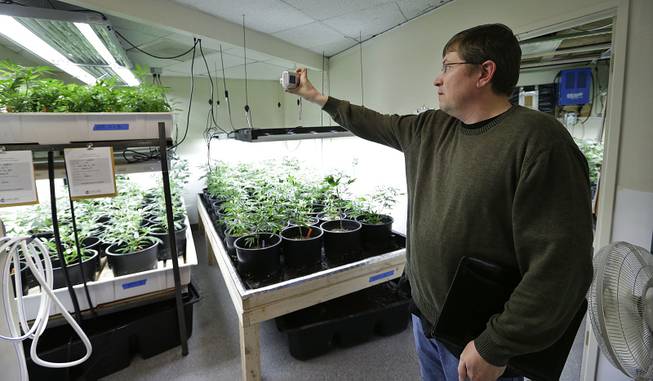
ASSOCIATED PRESS
In this photo taken April 4, 2013, Mike Steenhout, comptroller of Washington’s Liquor Control Board, takes photos as he tours a marijuana growing facility in Seattle.
Thursday, May 16, 2013 | 6:16 p.m.
SEATTLE — Officials in Washington state took their first stab at setting rules for the state's new marijuana industry Thursday, nearly eight months after voters here legalized pot for adults.
Among the preliminary regulations: They want to track marijuana from "seed to store." They'd put a cap on the number of retail outlets in each county, but not on the number of licensed pot growers or processors.
No sales of what the board described as marijuana extracts, such as hash, would be allowed — unless the extract is infused into another product — and all pot-related businesses would have to have security systems, 24-hour video surveillance and insurance.
Any marijuana product sold at state-licensed stores would carry a label noting that it "may be habit forming" and that "this product is unlawful outside of Washington state" — accompanied by an official pot logo, featuring Washington state with a marijuana-leaf silhouette smack in the middle.
Staff at the state Liquor Control Board spent long hours visiting marijuana grow houses, studying the science of getting high and earning nicknames like "the queen of weed" before issuing the rules.
"They are based upon hundreds of hours of internal research and deliberation, consultation with multiple industry experts and input from the over 3,000 individuals who attended our forums statewide," said Sharon Foster, chairwoman of the state Liquor Control Board.
Foster — who began a speech at a recent conference by saying, "My friends now call me the queen of weed" — said the board is trying to create a tightly regulated system that ensures both large and small operations a place in the emerging market.
Last fall voters made Washington and Colorado the first states to legalize the sale of taxed marijuana to adults over 21 at state-licensed stores.
In Colorado, devising rules for the pot industry fell to the Legislature, which has passed a series of bills laying out how marijuana should be grown, packaged and taxed. Gov. John Hickenlooper is expected to sign the bills May 28.
In Washington, people are allowed to have up to an ounce of dried marijuana; 16 ounces of a pot-infused solid, such as brownies; or 72 ounces of a pot-infused liquid, such as tea. The rules issued Thursday are essentially a draft of a draft: After gathering feedback, the Liquor Control Board will issue draft rules next month, then accept more public comment.
Marijuana sales in Washington should begin in early 2014 — unless the Justice Department has something to say about it. Pot remains illegal federally, and the DOJ could sue to try to block the licensing schemes in Washington and Colorado from taking effect.
Washington Gov. Jay Inslee said Thursday the board "is on the right track."
"I'm impressed with the depth and thoughtfulness of their approach and look forward to moving forward," he said.
When asked if he thought this would satisfy concerns held by U.S. Attorney General Eric Holder, Inslee said "I certainly hope so."
"I don't think you can design a system with much more integrity, as far as tracking the product from the producer to the consumer," he said. "This plan has a robust system of controls and checks in a variety of ways."
Some crucial questions remain — most notably, how much legal weed will Washington produce? Rand Corp., a subcontractor working for Washington's official pot consultant, is researching pot consumption in the state, and production levels will be based on that data.
Under the 46 pages of rules circulated Thursday, there would be advertising restrictions, including a ban on ads intended to appeal to those under 21.
Washington would use a criminal history point system in determining whether someone is eligible for obtaining a license to grow, sell or process pot. A felony in the past decade or two misdemeanors in the past three years would disqualify an applicant — but applicants could get a free pass on up to two pot-possession misdemeanors, and any single state or federal conviction for selling, growing or possessing marijuana could be waived on a case-by-case basis.
The board also said it will conduct criminal and financial background checks on "financiers" of pot businesses — anyone who invests more than $10,000.
The "seed-to-store" system for tracking marijuana, similar to Colorado's system for tracking medical marijuana, is designed to help prevent any pot from being diverted to the black market. It would require growers, processors and retailers to notify the board of any marijuana shipments, and to keep records such as when plants are harvested and destroyed.
Alison Holcomb, the drug policy director at the American Civil Liberties Union of Washington, led the campaign to legalize marijuana under state law. She said she was pleased to see the board balancing public safety and public health with the creation of a workable legal market for marijuana.
But Holcomb also said she was concerned about the board's interpretation of "marijuana-infused product" — an interpretation that would preclude hash or hash oil — highly potent forms of pot — from being sold at stores. The board determined that Washington's voter-approved initiative only allows the sale of marijuana or marijuana-infused products, and that hash is more properly considered an "extract."
If that's true, people in Washington could still be arrested for possessing hash — which, Holcomb suggested, was not the intent of the measure.
"If you've got hash oil that is 98 percent THC and 2 percent some emulsifying liquid that keeps it in liquid form, I would argue that's marijuana-infused product," Holcomb said.

Join the Discussion:
Check this out for a full explanation of our conversion to the LiveFyre commenting system and instructions on how to sign up for an account.
Full comments policy